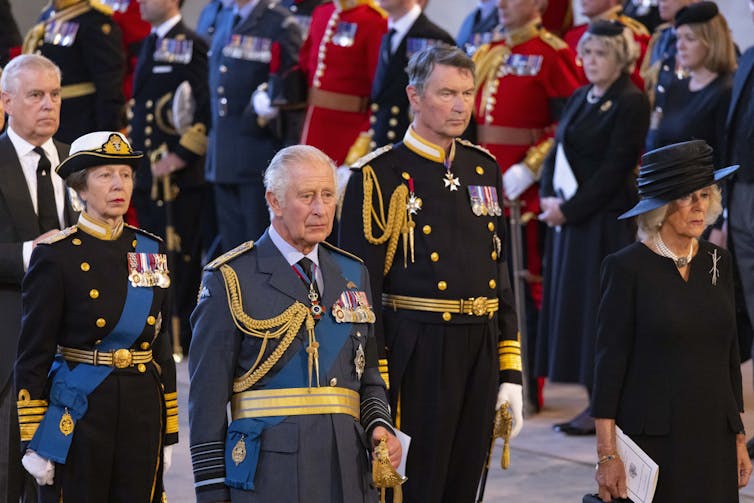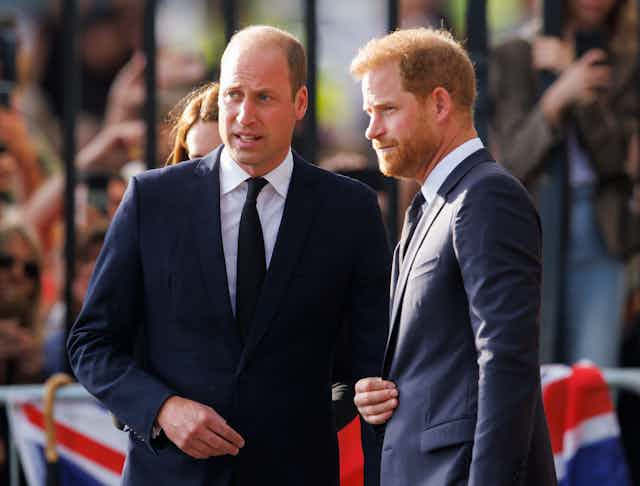Much has been made of supposed tensions between princes William and Harry over the last few years. But in the wake of the Queen’s death we have seen the brothers come together with their family, uniting to pay tribute to their grandmother and take part in official mourning activities.
Regardless of speculation about their relationship, it is typical for sibling bonds to be bolstered or rekindled at critical moments such as the death of a family member. Often our longest lasting relationships, sibling relationships are far from static.
Being one in a series of siblings is significant to who we are, though this role evolves throughout our lives. Hierarchies associated with birth order and age gaps can shift or even flip entirely as siblings weather illnesses, bereavements, parenthood, marriages, divorces, redundancies and so on.
In my new research, I’ve analysed over 100 adults’ written reflections about their sibling relationships, commissioned and archived as part of the UK’s Mass Observation Project. My findings reveal how critical life moments, such as the death of a family member, often led to these relationships intensifying and improving. This was true even between siblings who had not been in regular contact or whose relationship had become strained.

This article is part of Quarter Life, a series about issues affecting those of us in our twenties and thirties. From the challenges of beginning a career and taking care of our mental health, to the excitement of starting a family, adopting a pet or just making friends as an adult. The articles in this series explore the questions and bring answers as we navigate this turbulent period of life.
You may be interested in:
Hope from despair: how young people are taking action to make things better
COVID: how careful do I still need to be around older and vulnerable family members?
What is gentle parenting? An expert explains
Many participants described coming together to care for ill parents and to sort out administrative logistics following their death. They were grateful that they did not have to bear these burdens alone. While William and Harry’s responsibilities certainly look quite different, the sight of them performing the public face of mourning together is a familiar one to many siblings.
It is not just the sharing of practical tasks that bring the significance of sibling relationships into sharp relief following a family death. Many participants wrote about reminiscing on shared childhood memories at this time, and a feeling of privileged knowledge about their family shared only with their sibling.
Siblings can be something of an “anchor” in these situations. They help one another feel grounded, and facilitate a sense of belonging in time as they age and their families change.
One 58-year-old man described how his relationship with his older brother and sister improved following the death of their parents. As children, his sister (ten years his senior) had irritated him by trying to “mother” him. He argued regularly with his brother as they struggled to share a cramped bedroom. Contact with his siblings decreased once they moved out of the family home but resumed as they supported their mother and made arrangements following the death of their father.
The writer had also recently lost his mother. With both his parents gone, his bond with his siblings, formed through shared childhood experiences of poverty, took on a renewed significance in his life.
Of course, William and Harry’s childhood experiences and adversities will have been quite different, and we have seen them come together to publicly mourn the death of their mother as children. The importance of shared childhood memories, whether happy or difficult, are often heightened following the death of a close family member.

Coping without siblings
Of course, siblings do not always come together at moments like this. Respondents who remained estranged from their sibling or who did not have siblings often felt the absence of this relationship more strongly following a family bereavement or illness. Many “only children” in their 20s, 30s and 40s described feelings of trepidation about future caring responsibilities, which they worried about shouldering alone.
One 48-year-old man wrote poignantly about his sister’s terminal cancer diagnosis, and the strangeness of realising that they would not grow old together. He would have to face the responsibilities and challenges of caring for ageing parents alone.
One writer in her 40s described the ways her relationship with her sister, who is five years younger, improved in adulthood. The irritations and injustices of their childhood faded and their age gap felt less significant, allowing them to become friends.
However, this writer expressed worries about the future of her relationship with her sister. She envisioned a “nightmare” time trying to negotiate caring responsibilities for their mother in her old age.
William and Harry are living their family bereavement on the world stage. In many ways, their caring responsibilities bear little resemblance to the financial and time pressures that many families experience at times of loss. However, sibling bonds are special.
Even where relationships are turbulent, having siblings can feel something like travelling through life with a convoy. They anchor us to our past, and the background sense of “being there for us” can be revived at key moments in life, like the death of a parent or grandparent.

